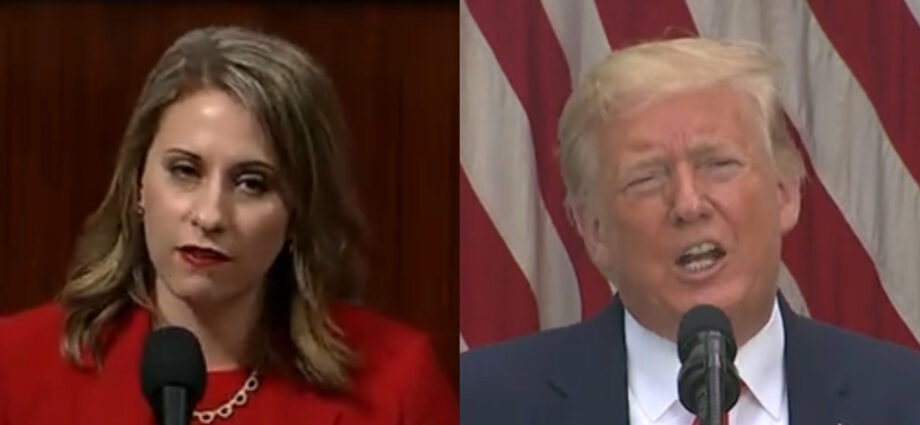Former Democrat House Rep Katie Hill has lent some support for a potential executive order that President Trump is looking into. The order would target Section 230 of the Communications Decency Act and that has been all the buzz on Twitter.
Hill has a vested interest after the nude photos of her were leaked which led to her resignation from her house seat. She said that “Section 230 has dangerously shielded big tech companies from liability, including around cyber exploitation. It needs reform. This is more important than Trump.” She implored everyone not to form a “partisan opinion” because of him.
Follow @ma_franks, @daniellecitron & @cagoldberglaw – they are experts on this. Tons of implications… I’m glad this topic is getting elevated but people need to get informed.
— Katie Hill (@KatieHill4CA) May 28, 2020
The ACLU has weighed in by saying that “Trump is not the President of Twitter.” They claim that “This order, if issued, would be a blatant and unconstitutional threat to punish social media companies that displease the president.”
They went further by saying that “The president has no authority to rewrite a congressional statute with an executive order imposing a flawed interpretation of Section 230.”
The finished by asserting that the Section “enables speech, not censorship” and that it “incentivizes platforms to host all sorts of content without fear of being held liable.”
The president has no authority to rewrite a congressional statute with an executive order imposing a flawed interpretation of Section 230.
— ACLU (@ACLU) May 28, 2020
Section 230 incentivizes platforms to host all sorts of content without fear of being held liable. It enables speech, not censorship.
We had reported previously on how FCC Commissioner Brendan Carr appeared on Tucker Carlson and offered support for the president. According to The Verge, he is facing opposition from a Democrat commissioner. From The Verge:
There’s a growing divide at the Federal Communications Commission over a proposed executive order by the Trump administration to regulate speech on social media platforms.
In statements made Thursday, Commissioners Jessica Rosenworcel and Brendan Carr took opposing sides over an executive order targeting Section 230 of the Communications Decency Act. Democrat Rosenworcel said that the order “is not the answer” while Republican Carr suggested that the proposal “makes sense.” If the current draft order is signed, the FCC would be at the helm of adjudicating complaints of social media bias online.
“This does not work. Social media can be frustrating. But an Executive Order that would turn the Federal Communications Commission into the President’s speech police is not the answer,” Rosenworcel said in a statement Thursday. “It’s time for those in Washington to speak up for the First Amendment. History won’t be kind to silence.”
Carr worked as an aid to Pai before Trump nominated him as an FCC commissioner in June 2017. In an interview with Yahoo FinanceThursday morning, Carr said “That [Section 230] has always said that if you engage in bad faith takedowns, you don’t get those bonus protections.” He continued, “I think given what we’ve seen over the last few weeks, it makes sense to let the public weigh-in and say ‘is that really what Congress meant” when they passed and provided those special protections.’”
- Tim Kaine Provides Cover For Joe Biden on the Border Crisis, Blames Lack of a ‘Robust Work Visa Program’ for ‘Some of the Chaos at the Border’ - March 27, 2024
- Elon Musk Rips NBC For Hiring and ‘Immediately’ Firing Ronna McDaniel ‘That’s How Biased They Are!’ - March 27, 2024
- Marjorie Taylor Greene Makes Move, Files Motion to Vacate Against Speaker Mike Johnson After House Passage of $1.2T Spending Bill - March 22, 2024

